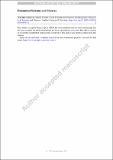Dynamical Systems and Sheaves
Author(s)
Schultz, Patrick; Spivak, David I; Vasilakopoulou, Christina
Download10485_2019_9565_ReferencePDF.pdf (627.2Kb)
Publisher Policy
Publisher Policy
Article is made available in accordance with the publisher's policy and may be subject to US copyright law. Please refer to the publisher's site for terms of use.
Terms of use
Metadata
Show full item recordAbstract
Abstract
A categorical framework for modeling and analyzing systems in a broad sense is proposed. These systems should be thought of as ‘machines’ with inputs and outputs, carrying some sort of signal that occurs through some notion of time. Special cases include continuous and discrete dynamical systems (e.g. Moore machines). Additionally, morphisms between the different types of systems allow their translation in a common framework. A central goal is to understand the systems that result from arbitrary interconnection of component subsystems, possibly of different types, as well as establish conditions that ensure totality and determinism compositionally. The fundamental categorical tools used here include lax monoidal functors, which provide a language of compositionality, as well as sheaf theory, which flexibly captures the crucial notion of time.
Date issued
2019-04-05Department
Massachusetts Institute of Technology. Department of MathematicsPublisher
Springer Netherlands